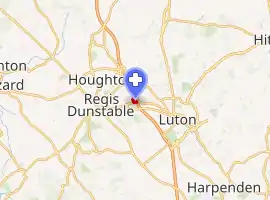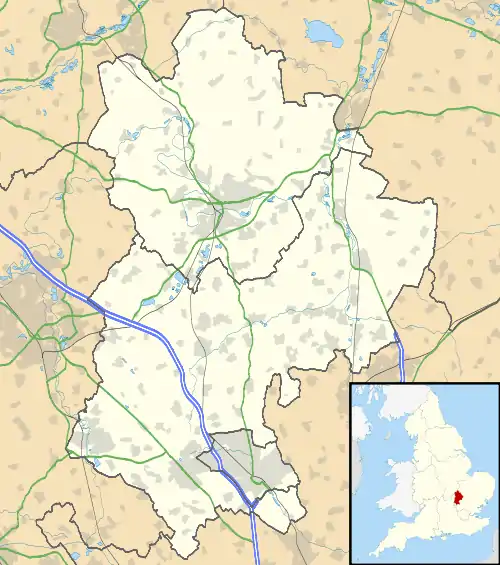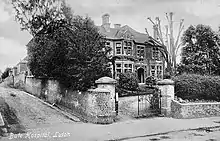Luton and Dunstable University Hospital
Luton and Dunstable University Hospital is an acute hospital run by Bedfordshire Hospitals NHS Foundation Trust. It provides medical and surgical services for over 350,000 people in Bedfordshire, the north of Hertfordshire and parts of Buckinghamshire. The hospital is often abbreviated to the 'L&D', and employs 3,400 staff.[2]
| Luton and Dunstable University Hospital | |
|---|---|
| Bedfordshire Hospitals NHS Foundation Trust | |
 | |
 Main entrance | |

| |
 Shown in Bedfordshire | |
| Geography | |
| Location | Luton, Bedfordshire, England |
| Coordinates | 51.894°N 0.474°W |
| Organisation | |
| Care system | NHS England |
| Type | Teaching |
| Affiliated university | University College London |
| Services | |
| Emergency department | Yes |
| Beds | 695 (Trustwide, Quarter 1, 2017)[1] |
| History | |
| Opened | 1939 |
| Links | |
| Website | www |
History

The hospital has its origins in the Bute Hospital, which was built on land donated by the Marquis of Bute (who lived locally at Luton Hoo)[3] on Dunstable Road in Luton and which opened in September 1882.[4] Although the facility was enlarged by two new wards in July 1902 and by a further extension in July 1912 there was little room for further expansion.[3]
Ten acres of land, situated in the countryside between Luton and Dunstable were purchased from Electrolux and a new hospital was built.[4] The hospital was opened by Queen Mary on 14 February 1939.[4] The wards in the new hospital were named after Queen Mary, Lady Ludlow from Luton Hoo and Arthur Buckingham, a Dunstable grocer who had bequeathed £4,000 towards the cost of the hospital.[4] The hospital joined the National Health Service in 1948.[5] The Duchess of Gloucester visited the Disability Resource Centre in July 1996[6] and Princess Anne opened the new St Mary's Wing Rehabilitation Centre in February 2003.[7]
After the facility became a teaching hospital for University College London in March 2012,[8] the Duke of Edinburgh opened a new state-of-the-art cardiac centre there in February 2013.[9]
Patient safety
Luton and Dunstable has been a Safer Patient Initiative site since 2004. Reducing the hospital's mortality rate was a priority for Chief Executive Stephen Ramsden, who believed that saving patient lives must be at the top of all chief executives' agendas.[10] Stephen Ramsden was appointed the director of the National Patient Safety Campaign,[11] after the hospital won the Health Foundation's Safer Patients Initiative.[12] He also received an OBE for services to healthcare.[13]
99% of A&E patients are treated within the target 4 hours. A BBC article maintains other hospitals can learn from Luton and Dunstable.[14]
It was named by the Health Service Journal as one of the top hundred NHS trusts to work for in 2015. At that time it had 3323 full-time equivalent staff and a sickness absence rate of 3.25%. 67% of staff recommend it as a place for treatment and 60% recommended it as a place to work.[15]
CQC evaluation
The Care Quality Commission rated Luton and Dunstable Hospital as "good" overall in June 2016. The findings of the report are summarised in the table below:[16]
| Safe | Effective | Caring | Responsive | Well-led | Overall | |
|---|---|---|---|---|---|---|
| Urgent and emergency services | Good | Good | Good | Outstanding | Outstanding | Outstanding |
| Medical care | Requires improvement | Requires improvement | Good | Good | Good | Requires improvement |
| Surgery | Good | Good | Good | Good | Good | Good |
| Critical care | Requires improvement | Good | Good | Good | Requires improvement | Requires improvement |
| Maternity and gynaecology | Good | Good | Good | Good | Good | Good |
| Services for children and young people | Good | Outstanding | Good | Good | Outstanding | Outstanding |
| End of life care | Good | Good | Good | Good | Good | Good |
| Outpatients and diagnostic imaging | Good | Not rated | Good | Outstanding | Outstanding | Outstanding |
| Overall | Requires improvement | Good | Good | Outstanding | Outstanding | Good |
References
- "Bed Availability and Occupancy Data – Overnight". NHS England. Retrieved 18 October 2017.
- "The L&D Today". Luton and Dunstable Hospital NHS Trust. Archived from the original on 1 December 2010. Retrieved 4 December 2010.
- "Bute Hospital". Great War Stories. Retrieved 9 September 2018.
- "About Us: the Origins and History of the Luton and Dunstable Hospital". Luton and Dunstable Hospital NHS Trust. Archived from the original on 10 April 2009. Retrieved 9 September 2018.
- "Luton and Dunstable Hospital, Luton". National Archives. Retrieved 9 September 2018.
- "Royal visits to Befordshire 1991-1999". Central Bedfordshire Council. Retrieved 9 September 2018.
- "Royal visits to Befordshire 2000-2009". Central Bedfordshire Council. Retrieved 9 September 2018.
- "Luton and Dunstable Hospital becomes a University Hospital for UCL Medical School". University College London. 12 March 2012. Retrieved 9 September 2018.
- "Prince Philip opens £5.5 million cardiac centre". ITV. 19 February 2013. Retrieved 9 September 2018.
- "Reducing avoidable mortality: Chief Executives lead the way" (PDF). NHS Institute for Innovation and Improvement. June 2007. Archived from the original (PDF) on 8 May 2009. Retrieved 4 December 2010.
- patientsafetycongress.co.uk
- "Luton and Dunstable Hospital NHS Trust selected as winner of The Health Foundation's Safer Patients Initiative". The Health Foundation. Archived from the original on 25 November 2010. Retrieved 4 December 2010.
- "NHS leaders honoured for services to healthcare". Health Service Journal. 2 January 2008. Retrieved 4 December 2010.
- Five secrets of a well-run A&E department 'BBC
- "HSJ reveals the best places to work in 2015". Health Service Journal. 7 July 2015. Retrieved 23 September 2015.
- "Luton and Dunstable Hospital: Quality Report" (PDF). Care Quality Commission. p. 25. Retrieved 19 October 2017.
Further reading
- Currie, Margaret (1982). Hospitals in Luton and Dunstable: an illustrated history. Advance Offset. ISBN 978-0950824000.